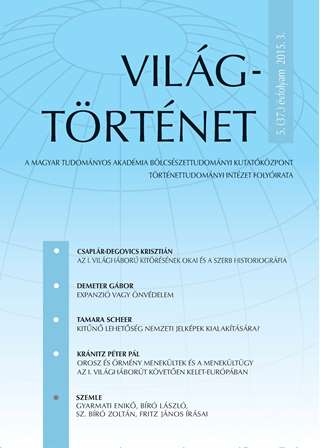Bajkeverők. A Balkan Committee és a macedóniai reformok (1903–1908)
Troublemakers. The Balkan Committee and the Reforms in Macedonia (1903–1908)
Author(s): Balázs BalatoniSubject(s): Pre-WW I & WW I (1900 -1919)
Published by: Magyar Tudományos Akadémia Bölcsészettudományi Kutatóközpont Történettudományi Intézet
Keywords: Balkan Committee; Ottoman Macedonia; Ilinden uprising
Summary/Abstract: The Canadian historian, Leften Stavrianos once wrote that „it is a curious paradox that so little is known of the organization which has played so prominent a role in Balkan affairs from the date of its establishment in 1903 […]”. The aim of the paper is to contribute to the history of a British pressure-group, the so-called Balkan Committee by examining its activities during the Macedonian Reforms (1903–1908). Ottoman Macedonia, the powder-keg of the Balkans, was one of the most complex crisis centres of pre-1914 Europe. After the disturbances in 1902– 1903 and especially after the Ilinden uprising, the Concert of Europe was about to introduce reforms in the three vilayets of Macedonia (Salonica, Monastir, Kosovo) which became known as the Mürzsteg Programme. Great Britain, as a main supporter of Concert diplomacy, supported Austria–Hungary and Russia, the two most interested Powers in the region, in their undertakings, as order and relative stability was a primary objective for British interests in the Balkans. The Balkan Committee was founded in such international context. Based on different primary sources (archival, parliamentary papers, the press, and published contemporary accounts) the author argues that the Balkan Committee was an institutionalized heir to the (pro-Bulgarian) Gladstonian liberal heritage. Moreover, the Committee’s approach to Balkan affairs reflects its radical-liberal members’ political objectives in domestic politics. The attempt of the Committee to influence decision-making process was decisive: the appearance of experts of Balkan affairs with personal experience and knowledge (with different national affiliations) became a crucial factor as it legitimated the Committee’s (and later other pressure-groups’) claim to dissent over foreign policy.
Journal: Világtörténet
- Issue Year: 2015
- Issue No: 3
- Page Range: 437-460
- Page Count: 24
- Language: Hungarian

